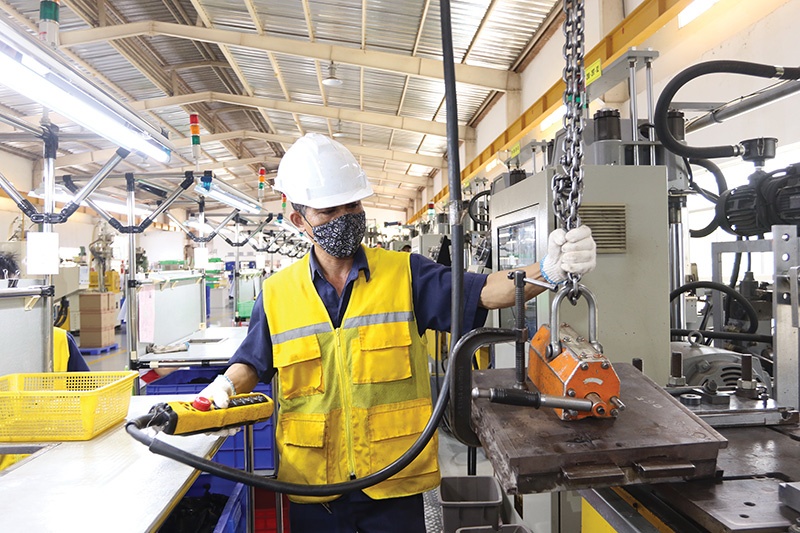Businesses anticipate COVID-19 rule change
 |
| Photo: Le Toan |
The Ministry of Health (MoH) has suggested permitting asymptomatic COVID-19 cases and close contacts of cases to go to work as normal in the quarantine period.
According to the proposal, which has been submitted to the National Committee for COVID-19 Prevention and Control for consideration and adoption, asymptomatic cases who are undergoing quarantine for seven days and their RT-RCR test results remain positive for the coronavirus, can work remotely and be allowed to take care of patients in their families, accommodation, or treatment facilities.
Besides that, F1 cases who have not been fully vaccinated are permitted to participate in urgent affairs of their units and localities through remote or in-person work.
In the case of in-person working, there should be a working area designated for them, ensuring a safe distance and that ventilation is adequate to reduce infection risk.
Like F0 cases, F1 cases would be allowed to travel using personal vehicles and comply with the health ministry’s preventive measures. They would have to undergo PCR or antigen tests on the fifth day from the last exposure date or as soon as they have symptoms of COVID-19 for treatment in line with the MoH’s regulations. If approved, the ministry’s suggestion will help manufacturers to take off the load on human force shortage.
Japanese-invested garment company Sakurai Vietnam Co., Ltd located in the north-central province of Thanh Hoa reported that since early this year, over 8,000 of their 12,000 employees have tested positive. At present, only two-thirds of employees travel to work, with the remaining either F0 cases or F1 cases staying at home to monitor health.
“The company is forced to either decrease the manufacturing lines’ capacity or convince employees to work overtime to maintain operations. However, at the peak time when there were too many F0 and close contact cases, the company’s operation has been interrupted,” said Nguyen Huu Quang, chairman of the company’s trade union. “The regulation to ask F1 cases to stay at home for five days to monitor health is not necessary because they will still come into contact with people in the community, thus the risk of infection is equal to the workplace.”
On March 10, Vietnam reported over 160,000 new cases of COVID-19 for the first time. The statistics, published by the Vietnam General Confederation of Labour, show that the volume of workers who have to stop work has been very high, with the northern port city of Haiphong reporting 42,000 cases and the northern province of Bac Giang recording 22,000 cases. In Hanoi, nearly one-third of the 18,000 labourers working in the garment and textile sector has tested positive at some point.
Ahead of concerns about the risk of supply chain interruption, several employers proposed that the local authorities create a flexible mechanism for asymptomatic cases so that they can still return the work as soon as possible. For example, at electronics manufacturer Hosiden Vietnam Co., Ltd. in Bac Giang, the company’s leadership required the province to allow its employees to come back to work right after they have a negative test result without staying an additional seven days.
While waiting for the MoH’s proposal to be approved, Long An People’s Committee has issued a temporary decision to permit F0 and F1 cases in isolation to return to offices and facilities. The condition is that agencies and businesses have to comply with strict regulations on preventing and controlling the pandemic.
At the recent Vietnam Business Forum, some foreign business associations asked the Vietnamese government to loosen isolation regulations on F0 and F1 cases because of a very high rate of vaccination across the country, making it more favourable for employers to ensure sufficient labour.
What the stars mean:
★ Poor ★ ★ Promising ★★★ Good ★★★★ Very good ★★★★★ Exceptional
Related Contents
Latest News
More News
- PM outlines new tasks for healthcare sector (February 25, 2026 | 16:00)
- Ho Chi Minh City launches plan for innovation and digital transformation (February 25, 2026 | 09:00)
- Vietnam sets ambitious dairy growth targets (February 24, 2026 | 18:00)
- Masan Consumer names new deputy CEO to drive foods and beverages growth (February 23, 2026 | 20:52)
- Myriad risks ahead, but ones Vietnam can confront (February 20, 2026 | 15:02)
- Vietnam making the leap into AI and semiconductors (February 20, 2026 | 09:37)
- Funding must be activated for semiconductor success (February 20, 2026 | 09:20)
- Resilience as new benchmark for smarter infrastructure (February 19, 2026 | 20:35)
- A golden time to shine within ASEAN (February 19, 2026 | 20:22)
- Vietnam’s pivotal year for advancing sustainability (February 19, 2026 | 08:44)

 Tag:
Tag:




















 Mobile Version
Mobile Version